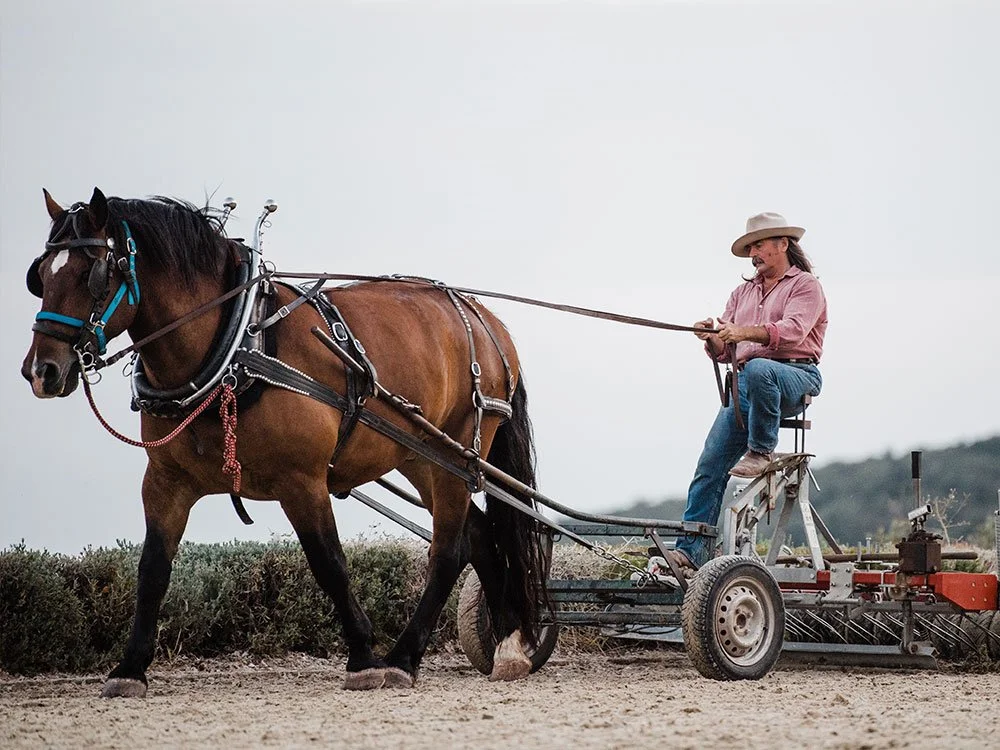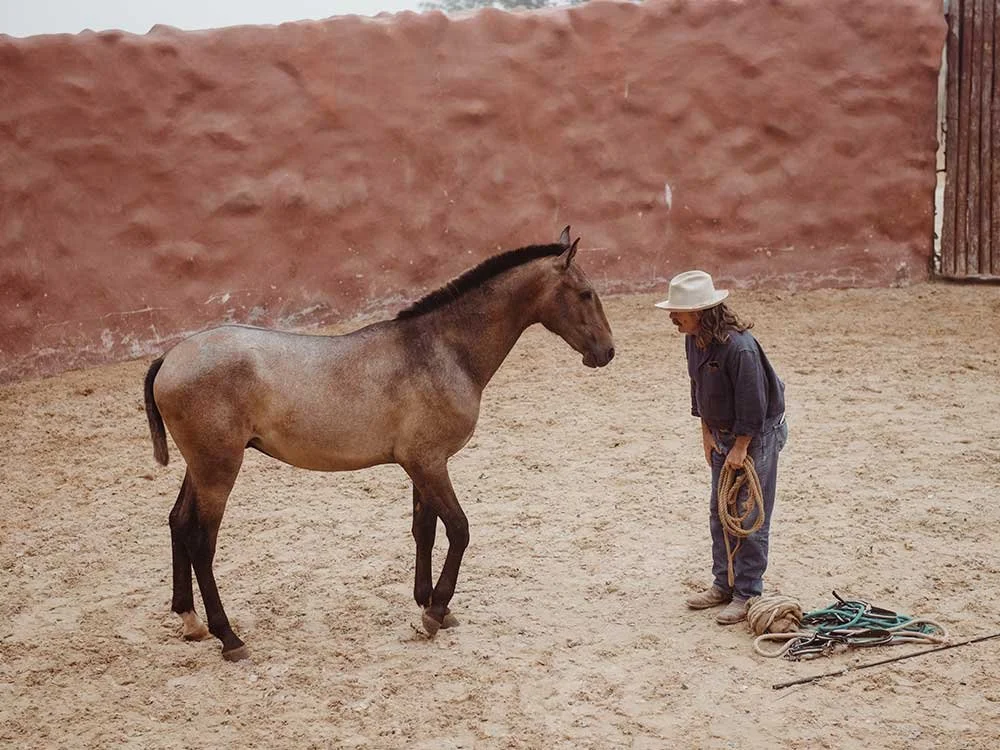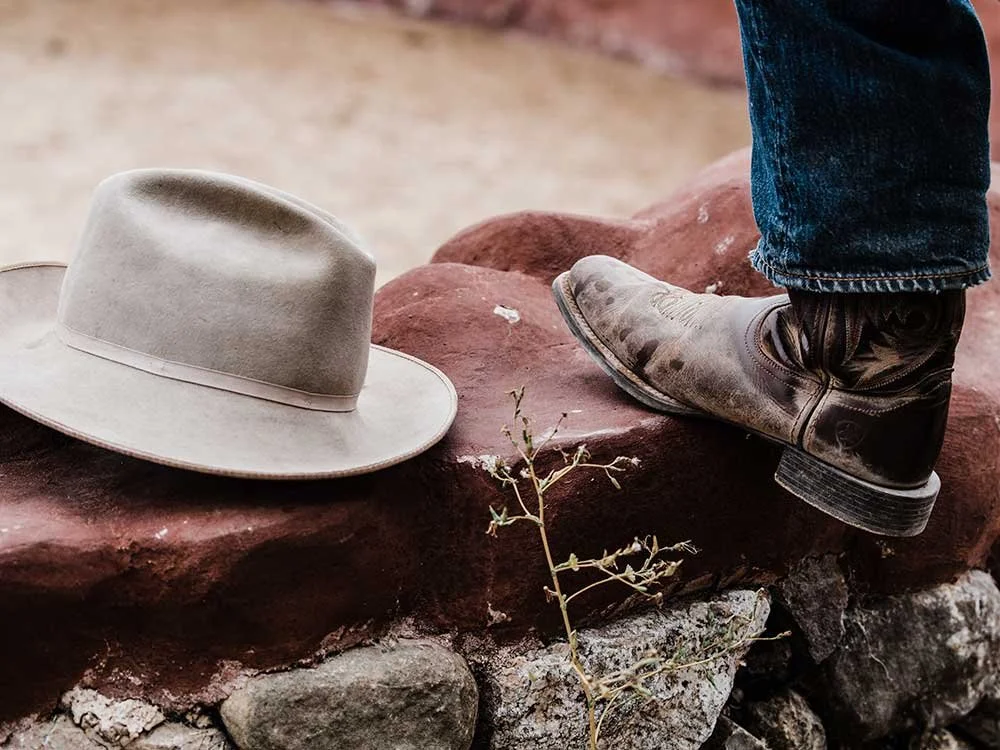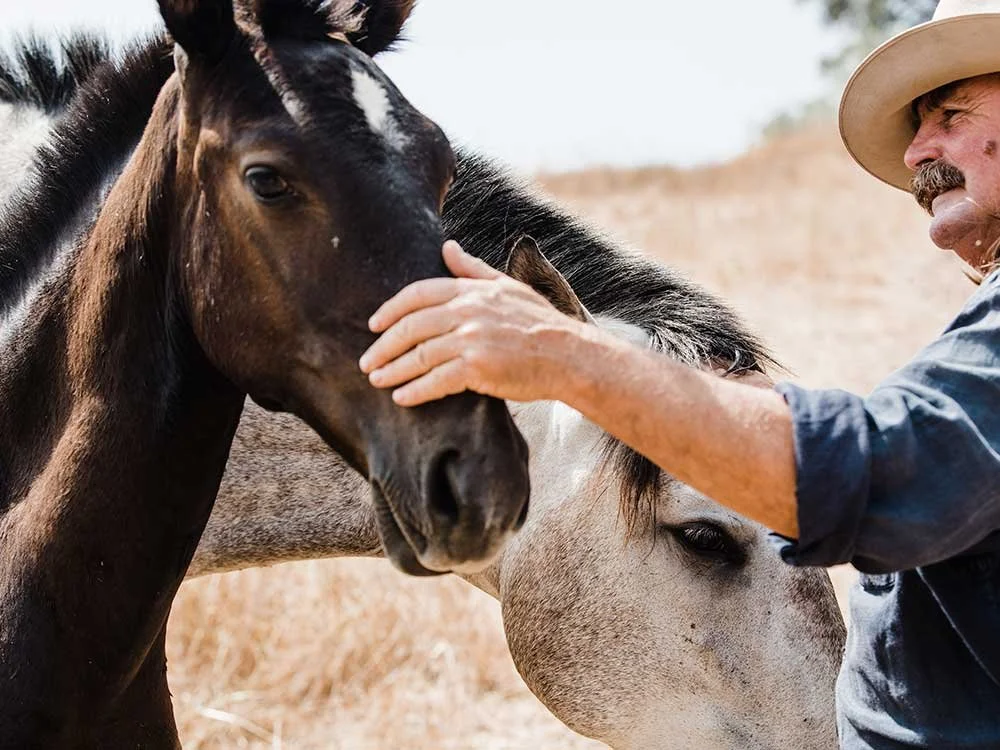Interview with La Donaira’s own cowboy Seamus Gaffney
Part 1: The Early Years
Seamus Gaffney has been a part of La Donaira from its inception. He has been working assiduously for the past 12 years building trustful relationships between man and horse, according to the principles of natural horsemanship, also known as natural dressage or horse whispering. An indomitable spirit with a big heart, we talk to him about his life’s journey and how he ended up becoming an integral member of La Donaira’s core team.
LD: Can you talk to us about your childhood and what was your first contact with a horse?
Seamus: I come from a place called County Cavan, in the Northern part of Ireland. I was born in 1953 and Ireland hadn’t changed much in a hundred years. The working people and small farmers like my family used burros (donkeys) for all the work of transportation, hauling, fuel, milk, anything. Horses were used just for ploughing. We weren’t very well off and we didn’t own our own plough horse so we used to loan a plough horse from the next door farmer when he had finished using it. If you did well then you bought a plough horse.
LD: Was owning a plough horse a marker of wealth?
Seamus: It would have been in a sense where you were doing well if you had a couple of plough horses. But we’d always have donkeys, maybe a pony, but it was normal, it was the 1950’s rural Ireland and I remember the village that we were from. When I go back to Ireland, of course everything has changed and you don’t see any donkeys any more but I can squint my eyes and I remember all the donkeys and carts being tied outside usually at the bars after market days, so in my short life time I’ve actually seen Ireland as it would have been a hundred years ago. The only people that had cars then were maybe doctors, and land agents and people like that.
LD: How old were you when you started working with horses?
Seamus: My first job was doing a milk round in Ireland with a horse when I was very young, 8 or 9. But that was again normal, we didn’t have cars or trucks and we used horses. I didn’t think there was anything special about that. That’s what it was. I collected big cans of milk on a flat bed carriage, about 8 cans and I had to lift them up as a young thing. They were as heavy as you are, at 6 o clock in the morning by the way. Seems like I’m making a sad story but its not, that’s just the way it was. We were working people.
LD: Did you get paid?
Seamus: I don’t really remember but I know I had to do it. You did it before you went to school. My father would lend us out and it would be repaid in kind. Small farmers and people helped out and children were expected to work. My mother used to drive when my grandfather had an accident, she was 8 or 9 years old. After returning from school she would do a lot of work with the donkeys, taking fuel from the fields back to the house. Its what life would have been like in many many European countries in the 1880’s. Remember, Ireland never had an Industrial Revolution. We were a rural country right up to I would say the 1970’s and then it changed dramatically.
LD: When, and why did you leave Ireland?
Seamus: We left, when I was in my early teens. We left because of poverty, we felt poor. Well, my father did. He didn’t want to be a farmer, he wanted to go to America but instead of going to America we went to England because it was closer. For hundreds of years people had been crossing the Irish Sea for seasonal work and coming back, but of course lots stayed in the big cities in England. The irony is that we were rural people, but we went to the cities and then we built the railways and the motorways and it´s a whole history of Irish labour.
LD: Was your father working in the railways?
Seamus: He was, and a lot of underground work when the undergrounds were being built and that was terribly hard work. But then I suppose if you compared with maybe getting 5 pounds a week in Ireland in 1955 and you cross over the water and you get 20 or 25 – it sounds nothing now, but it was a big thing then. Anyway, thousands and thousands of Irish people, I think from 1950 to 1960, as many as 60 000 Irish people under the age of 25 were going to work in England which was a bit of a shame for Ireland actually.
LD: And did you feel less poor when you were there?
Seamus: I didn’t feel poor at all in Ireland because it was our community and we played our games, there were a lot of great characters and it was a lot of fun aside from the hard work.
LD: How was it for you moving to England?
Seamus: Horrible, I hated it. I remember the first scene seeing my first ship, well not my first one but certainly my first time on a ship crossing the sea and then everything was grey because the trains were all steam trains and just the sounds it made were awful. I just remember seeing everything grey and that was my first impression.
LD: Did you knew you were leaving?
Seamus: I didn’t know we were leaving for good. It was always “we are going for a while” but I’d go back home every summer when my grand parents were alive and I never wanted to come back but then your life starts over there and it was a different life. Once my father had tasted the delights of London he didn’t really want to go back to being a small time farmer in rural Ireland. It´s an old story, people go to the cities and then of course you don’t see it but the rural life is dismantled. Ireland as a country was a monoculture for probably longer than a lot of other countries so that gave it its character and now I feel I’m a foreigner when I go there. I’m a foreigner everywhere.
LD: So in your early teens you were in London, were you working there with horses?
Seamus: No, I went into the butchering trade because my grandfather was a butcher and I wasn’t in school any longer. My school had ended at 14 so my father went “does that fellow have a job yet?” and my mother got me into a butcher shop. No education, stuck in another country and had to get on with whatever came up. I had to earn money. My father had a black sense of humour, or an Irish sense of humour, and he would call me the lodger. He said to my mother, “has the lodger paid his rent this week?”, because I had to give her some money. That was the start of my working career and I’ve done many other things besides that.
Part 2: The UK and Abroad Years
LD: What did you do after working as a butcher? Did you start working with horses then?
S: No, from the butchery I went into my father’s profession which was the gas industry. From Scotland to the South we were laying the huge mains from the sea through the ground so people could have gas. Then, I actually got involved in the art world for a while. I went to night school and did various things with still life’s and model drawings. But back to horses, I always had a thing for them. But in the city I didn’t know how I would ever get to working with them. I never thought about going just to ride them. I couldn´t afford going to a poncey stable and pay to ride a horse, we just didn’t do that. My father who had worked with horses since he was a child too, he just didn’t talk about them. He liked them, but the only time we talked about them was when I got older, when I could drink in a pub and all the Irish guys would meet in the bar and they always talked about work, horses, and sometimes women.
LD: So how did your career in Natural Horsemanship begin?
S: I went to America, I went to Montana in my late twenties. I was looking for a way of working with horses and I knew there had to be a better way of not just training horses, but handling horses and being around them in a more natural way. In the 1980’s things were happening with horses, and there was kind of a revolution, people talking about Monty Roberts, so it was kind of happening. Then it was about finding people who were doing it, and there were not many people around, but I was lucky enough to find a few people in Montana. I worked for nothing to actually have the privilege to work with youngsters. Professional people would not let you near a young horse unless you had a way or you got the experience and the only way you got experience was to do all the hard work and it was really tough work. And then a few years later in the 80’s I went to Brazil and that was a wonderful experience because we were working with cattle and horses in a real hard-working ranch.
LD: You were a wrangler in Brazil?
S: No, I wasn’t a wrangler. Actually, funny enough, wrangler is a man who works just with horses. I suppose you can call me a cowboy. Of course, down there they call them gauchos, and they are tough guys. They used to wear a .38 pistol and a big knife.
LD: Where did you go from Brazil?
S: After Brazil I decided I wanted to continue working with horses. Then I went back to England and I got involved with the best people in the industry who were doing Western riding. I didn’t particularly want to do Western riding but I liked the way they started their young horses. I had a child at the time so all these things are going in the background. Then in England, Germany, Italy and quite a few places in Europe were doing Western riding, which was an American way of riding, but they did a lot of natural horsemanship, because to be able to ride the horse naturally you had to bring the horse up a lot better than a lot of people did. The people that were training the horses were naturally seeking out people who knew how to turn these horses out.
Quite a few Americans came over and they gave seminars and it started to grow. I was there at that time and I got a job with a trainer who had 2 American trainers that worked with us. That is when I started really working with yearlings and 6 month old horses and I didn´t need convincing in their Natural Horsemanship teachings because I knew that this was the way to work with horses. You had to get the horses young and although its slower at the beginning you make up for it in their behaviour and things go much more smoother. Working with young horses is everything and you reap what you sow.
LD: So, training with the yearlings was in the UK?
S: Yes. I was lucky enough that I didn´t have to travel because they were importing American quarter-horses because Western riding became so popular. Then they started breeding them but, of course, in Britain at the time they weren´t using them for cattle. They were using them for show, which I wasn´t interested in but they had foals and yearlings and I got the job of training all the young horses.
LD: Where did you go from there?
S: We are only up to the 1990´s, well a lot happened in between that, but I had decided that my profession would be horses. Cutting a long story short, I did get more jobs and strange ones. I got a job in the mountains of North Wales because they wanted to catch the wild ponies because somebody in the 1890’s had thrown a few Arab horses in the Welsh Mountains and they had hundreds of these beautiful ponies. Anyway, they paid me and this other guy to go round them up and bring them down and start to break them in, that was real cowboy work, and that was in a place called Snowdonia. That was a great job, and from that I got more work and I was working with horses full time. I took jobs sorting out problem horses, jobs driving horses, and I also got involved in carriage racing for a while.
LD: Carriage Racing?
S: Well, its called a marathon. You take off and do many kilometres through water and mountains and you have one or two horses in the front. I got on the training side as well because not only was I driving, I was starting young horses to pull carriages and that was a great learning experience. I think its a bit harder to get horses to pull things than people believe.
LD: What is it about working with horses that you enjoy the most? And what qualities do you think working with horses instil?
S: Companionship. I feel that from them and I enjoy the relationship that you build with these wonderful animals. If you spend lots of time with them, almost every day, which I usually do you get so much from it, but you have to put that time in. Then it becomes a way of life and that’s my way of life. I’m fairly good with them and they are good with me and I would really miss it terribly if they weren’t in my life.
In terms of qualities you need to have a good work ethic to be with them and discipline because its hard work. Patience, of course, especially when handling young horses. I handle horses from when they are born to their first ride or their first drive so for me its even more intense but its a wonderful thing to be there with them all the way through. After all, they didn’t ask to be with us, we said “you’ve gotta be with us”, and its nice if they accept that, and they want to be with you, and that sort of thing is happening and you feel it, so it gives you many things. If you haven’t got patience you can’t successfully work with horses.
Part 3: La Donaira Years
LD: When did you arrive to Spain?
S: Fourteen years ago I did a demonstration with the ponies I was starting in Wales. I built a round pen, I cut the trees down for it, split the timbers, and in the crowd was a couple, and they were going to Spain to open up a riding trekking place where they would take people in the mountains. They were into the Appaloosa , an American breed made famous into by an American Indian tribe, the Appalousa. They are very beautiful and special horses. I remember thinking “why are you bringing horses to Spain”, I didn’t know much about Spain but I knew it was a land of horses. Anyway, they insisted so I helped them start up, and they had a bunch of 2 year olds. So I got busy with them and I spent nearly two years there in a place not far from here called Setenil.
LD: And your arrival to La Donaira?
S: That job was coming to an end and somebody told me that there was this farm near El Gastor. She said “they are looking for someone like you”, someone who could actually not just ride horses, but also train them, catch them, and all the rest of it, so I came up here and there was one guy at the time, not many other people. There were about 35 mares and their foals. And the foals were about 8 months old and they should have already been taken away from their mothers. You could walk up to them, but you couldn’t get a head collar on them. Horses are sweet enough when they want to come to your space and touch you but as soon as I wanted to grab hold of their heads, off they go! Also there were no facilities here, so it was a hard hard job when I first came here. They never gave me a job, I just had to do it and they’d pay me, and I didn’t think I’d get a job but I caught all the horses anyway.
LD: This was about 12 years ago?
S: It must have been around that time, yes. I mean really, to tell you the truth, I came here when I was old. I’m well old now but for a horse man its a heaven. Its beautiful as you know, and I was always very interested in the project and I never really worked with Lusitanos and they are a magnificent breed and so that just gathered momentum. I was offered a job, and the rest is history isn’t’ it? I mean we breed horses and I’ve been lucky enough to be kept here and I still work with the young horses, and I feel I’ve got the experience to do it.
LD: So how many horses do you think you’ve worked with since you’ve been here?
S: I don’t know, must be more than 70 horses I suppose. How many foals were born the past 12 years? Approximately 8 a year, so that gives you an idea, so hopefully we will get some nice sport horses. Dressage is still the main sport, and we want to get really a good stock of horses that would be able to compete on a very high level.
LD: I know you work with the foals and do Natural Horsemanship demonstrations; do you do hacks with clients as well?
S: No, I don’t. I used to, I’ve done everything here. I’ve taken carriage rides out, the hacks. In fact, this weekend I’m doing it because the girls are going to a festival so I said I would come and give them a break but its not really my job. My job is working with young horses. I also teach when I can helping people who want to learn a different side of horses.
LD: You teach them that its not through domination? Is it a gentler way?
S: You would call it gentle in a way but its a completely different way because its not about hitting horses with a stick or even being too gentle, because too gentle is not getting the job done. So, there is a middle ground, the equilibrium and you want to find that and work that way with your horses or mules.
LD: I imagine that if you are using Natural Horsemanship instead of other techniques of raising young foals it takes longer because you are not relying on domination and intimidation which seems a much quicker way to “break them”.
S: It is slower at the beginning but then you make up for the behaviour and things go much smoother so it speeds up in that way. Working with young horses is everything and you reap what you sow.
LD: What is it about this project that drew you to it and that you like?
S: What drew me to it was first of all the actual breed of the horse. I’ve worked with many many breeds and I did read up on the Lusitano and they sounded fascinating, so that was a big drawing point for me. Secondly, the location. The mountains here in Andalucía are just magical and thirdly Manfreds’ vision of the farm and how he is driven. I did get to be friends with Manfred and agree with his thoughts and his project has always been very interesting to me.
LD: And lastly, do you have a fondness for a particular breed?
S: I must admit, I did like the American quarter-horse. They were called quarter horse because they were the fastest horse over a quarter of a mile. I like them because I’m into working horses, and they were just made to work cattle and horses. I’ve got a horse here, she’s my own, Sissy, and she is not a tall horse but if you squint your eyes a bit she looks a bit like a quarter horse. I did train her up to herd the horses and she is wonderful. In the early days here, I did a lot of work on her back with the horses. When the veterinary wanted horses up, I would go down with Sissy and she was great at that job. I hardly have to touch the rain, she would just bring the horses up. And that could happen again up here. I think that the future here is a big one. This will be a big exciting place in the future. Maybe I won’t be part of it but I’m so proud to have been a part of its beginning and one day to be part of its past.





